-

新人教版高中英语必修2Unit 5 Music-Reading for Writing教案二
The Internet celebrity Gao Yifeng. Years ago, he owned 5 companies and the staffs over 1,000, but during the economy crisis, he became nothing but debt. He was so worried that his hair became white overnight. There was a time when he wanted to killed himself. But after listening to the song Start Over by Liu Huan, he decided to cheer himself up. He started a steamed bun shop and gradually became a national chain shops. Now he became successful again.Walter Haddon said, “Music is the medicine of a troubled mind.” Music contains such a pleasant and inspiring force. Music gave him courage and bravery. When he listened to the song, it made his spirit fly like a kite in the wind. Music gave him strength and brought him relief. It was the rock I leant on to become strong and to get through those hard times. I hope none of us have to go through the same kind of suffering that he did. At the same time, we all go through various periods when we feel sad or alone. During those times, music can help us in the same way that it helped him. I hope we all will somehow begin to treasure music and make it a part of our life. Thank you for your listening !5.Revise your writing each other.Does he/she explain how music has changed his/her/someone else’s life?Are some of the rhetorical devices included and used properly ?Does he/she talk about how music makes him/her/someone feel?Is the first word in each sentences capitalised?Does he/she use correct punctuation ?
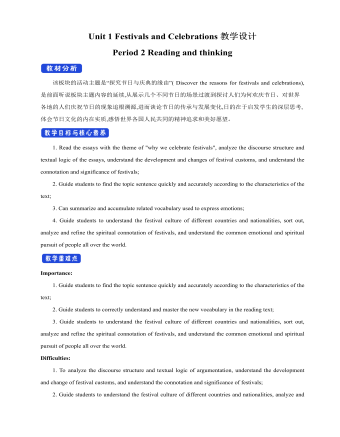
新人教版高中英语必修3Unit 1 Festivals and Celebrations教学设计三
*wide range of origins(= a great number of different origins, many kinds of origins)*It featured a parade and a great feast with music, dancing, and sports. (=A parade and a great feast with music, dancing, and sports were included as important parts of the Egyptian harvest festival.)*.. some traditions may fade away and others may be established.(= Some traditions may disappear gradually, while other new traditions may come into being.)Step 6 Practice(1) Listen and follow the tape.The teacher may remind the students to pay attention to the meaning and usage of the black words in the context, so as to prepare for the completion of the blanks in activity 5 and vocabulary exercises in the exercise book.(2) Students complete the text of activity 5 by themselves.The teacher needs to remind the students to fill in the blanks with the correct form of the vocabulary they have learned in the text.Students exchange their answers with their partners, and then teachers and students check their answers.(3)Finish the Ex in Activity 5 of students’ book.Step 7 Homework1. Read the text again, in-depth understanding of the text;2. Discuss the origin of festivals, the historical changes of related customs, the influence of commercial society on festivals and the connotation and essential meaning of festivals.3. Complete relevant exercises in the guide plan.1、通过本节内容学习,学生是否理解和掌握阅读文本中的新词汇的意义与用法;2、通过本节内容学习,学生能否结合文本特点快速而准确地找到主题句;3、通过本节内容学习,学生能否理清论说文的语篇结构和文本逻辑,了解节日风俗发展与变迁,感悟节日的内涵与意义。
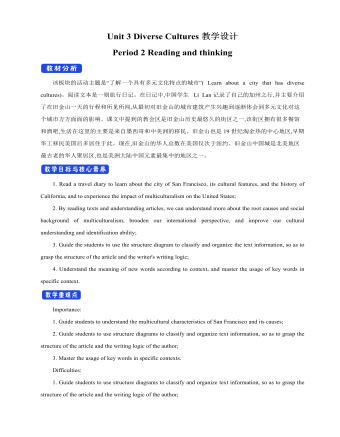
新人教版高中英语必修3Unit 3 Diverse Cultures教学设计二
(2)Consolidate key vocabulary.Ask the students to complete the exercises of activity 6 by themselves. Then ask them to check the answers with their partners.(The first language:Damage of the 1906 San Francisco earthquake and fire.A second language: Yunnan - one of the most diverse provinces in China).Step 5 Language points1. The teacher asks the students to read the text carefully, find out the more words and long and difficult sentences in the text and draw lines, understand the use of vocabulary, and analyze the structure of long and difficult sentences.2. The teacher explains and summarizes the usage of core vocabulary and asks the students to take notes.3. The teacher analyzes and explains the long and difficult sentences that the students don't understand, so that the students can understand them better.Step 6 Homework1. Read the text again, in-depth understanding of the text;2. Master the use of core vocabulary and understand the long and difficult sentences.3. Complete relevant exercises in the guide plan.1、通过本节内容学习,学生是否理解和掌握阅读文本中的新词汇的意义与用法;2、通过本节内容学习,学生能否结合文本特点了解文章的结构和作者的写作逻辑;3、通过本节内容学习,学生能否了解旧金山的城市风貌、文化特色,以及加利福尼亚州的历史,体会多元文化对美国的影响。
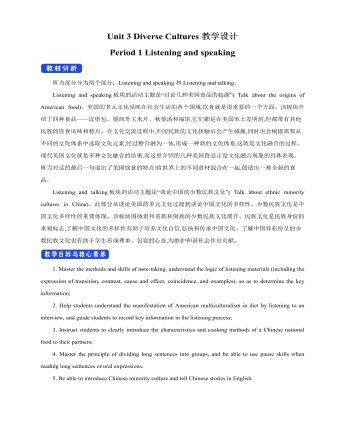
新人教版高中英语必修3Unit 3 Diverse Cultures教学设计一
Activity 81.Grasp the main idea of the listening.Listen to the tape and answer the following questions:Who are the two speakers in the listening? What is their relationship?What is the main idea of the first part of the listening? How about the second part?2.Complete the passage.Ask the students to quickly review the summaries of the two listening materials in activity 2. Then play the recording for the second time.Ask them to complete the passage and fill in the blanks.3.Play the recording again and ask the students to use the structure diagram to comb the information structure in the listening.(While listening, take notes. Capture key information quickly and accurately.)Step 8 Talking Activity 91.Focus on the listening text.Listen to the students and listen to the tape. Let them understand the attitudes of Wu Yue and Justin in the conversation.How does Wu Yue feel about Chinese minority cultures?What does Justin think of the Miao and Dong cultures?How do you know that?2.learn functional items that express concerns.Ask students to focus on the expressions listed in activity. 3.And try to analyze the meaning they convey, including praise (Super!).Agree (Exactly!)"(You're kidding.!)Tell me more about it. Tell me more about it.For example, "Yeah Sure." "Definitely!" "Certainly!" "No kidding!" "No wonder!" and so on.4.Ask the students to have conversations in small groups, acting as Jsim and his friends.Justin shares his travels in Guizhou with friends and his thoughts;Justin's friends should give appropriate feedback, express their interest in relevant information, and ask for information when necessary.In order to enrich the dialogue, teachers can expand and supplement the introduction of Miao, dong, Lusheng and Dong Dage.After the group practice, the teacher can choose several groups of students to show, and let the rest of the students listen carefully, after listening to the best performance of the group, and give at least two reasons.
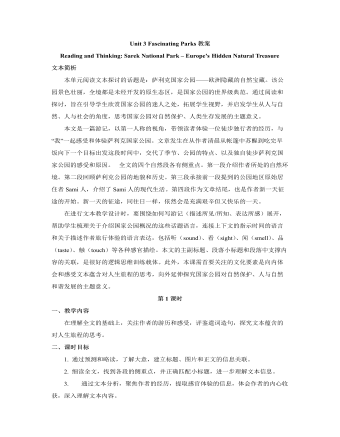
新人教版高中英语选修1Unit 3 Fascinating Parks教案
2. Explore the significance of the establishment of Sarek National Park.Q1: Which event is the most important one in the park’s history?Ss: The establishment of Sarek national park in 1909 is the most important one.Q2: Is it worth making a place like Sarek a national park? Give your reasons.Ss: Yes. In this way, the place can be kept in its natural state and natural beauties and other rare and valuable resources can be preserved instead of being destroyed by endless exploitation driven by profits.Q3: How does the writer organize his introduction to the history of Sarek?Ss: The writer organizes his introduction in the sequence of time, using time indicators such as “used to”, “around 9,000 years ago”, “soon after”, “following the reindeer”, and “in 1909”.Q4: What is the feature of the language used to introduce the history of the park?Ss: The introduction to the park is to provide facts, using time indicators to organize the events. Sentences starts with “third person” and passive voice is used more often, feeling objective.【设计意图】学生寻找和梳理公园历史上的重要事件,体会人与自然的和谐关系,评鉴介绍性语言的特点。【核心素养提升点】发展自主提取、梳理文本信息能力,训练逻辑思维和高阶思维。Activity 3: Highlighting the secret of the text
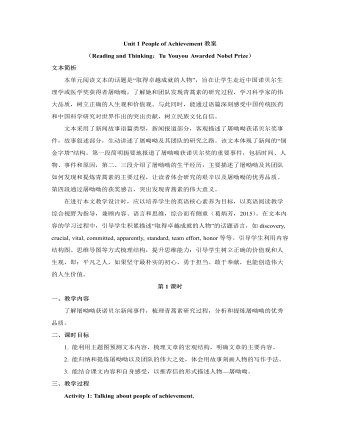
新人教版高中英语选修1Unit 1 People of Achievement教案
【设计意图】 基于上述分析,学生总结新闻故事语篇类型的特征,即标题的省略性、导语的概括性、数据的支撑性和引语的重要性。在此过程中,学生对新闻故事语篇类型有了更深层次的了解,对于学生阅读和写作具有重要意义。Activity 7: Discussing to make a writing outline.本活动为实现课时目标3。1.Discuss and make an outline.Ask students to discuss in groups of four and make their own writing outline.To celebrate the 70th anniversary of the People’s Republic of China, our school newspaper starts a new column about “People of Achievement”. You plan to write a news story about one of the winners of the Medal of the Republic in 2019, including Yu Min, Shen Jilan, Sun Jiadong, Li Yannian, Zhang Fuqing, Yuan Longping, Huang Xuhua and Tu Youyou.【设计意图】 教师创设情境,即为庆祝新中国成立70周年,校报新增有关卓有成就人物的栏目,你将从共和国勋章获得者中,选择一位写一篇新闻故事,向该栏目投稿。学生以小组合作形式,展开讨论,并写出新闻故事框架,有助于学生课后收集人物信息,撰写新闻故事。
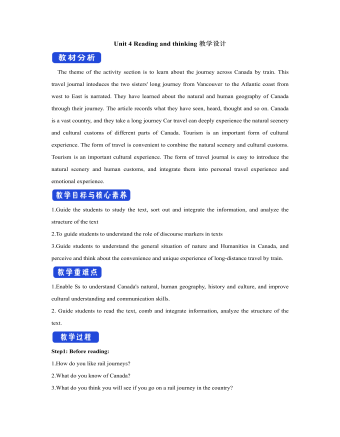
新人教版高中英语选修2Unit 4 Reading and thinking教学设计
【词汇精讲】highlight n.最好或最精彩的部分 vt.突出;强调;使醒目One of the highlights of the trip was seeing the Taj Mahal.这次旅行的亮点之一是参观泰姬陵。Your resume should highlight your skills and achievements.你的简历应该突出你的技能和成就。The report highlights the major problems facing society today.报告强调了当今社会所面临的主要问题。I’ve highlighted the important passages in yellow.我用黄色标出了重要段落。7.Edmonton is freezing cold in winter,with daily temperatures averaging -10 ℃.埃德蒙顿冬季寒冷,日平均气温为-10°C。【词汇精讲】freezing adj.极冷的;冰冻的Leave a basin of water outside in freezing weather.在冰冻的天气里,放一盆水在室外。It’s freezing cold outside so wear a warm coat.外面超冷的,所以穿一个暖和一点的外套吧。8.It was not until 9:30 a.m.that they finally reached the capital of Ontario,Toronto.直到上午9时30分,他们才终于到达多伦多的首府安大略省。【句式剖析】本句是一个强调句,强调的是句子的时间状语until 9:30。含有not...until...的句子的强调句为It is not until...that...,that后面的句子要用肯定形式。It was not until then that I suddenly realized nobody was happier than I was.直到那时我才突然意识到没有人比我更幸福了。
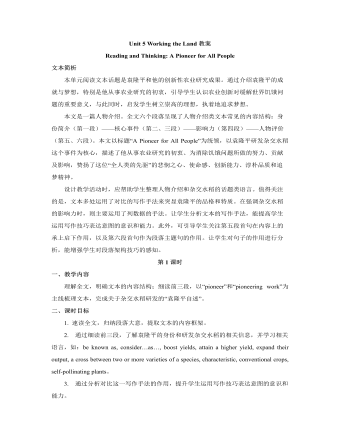
新人教版高中英语选修1Unit 5 Working the Land教案
1. 完成文本主要信息填空(斜体字部分设空):As a witness to farmers’ poor harvests and even a severe shortage of food, Yuan Longping was determined to devote his life to tackling this crisis. After graduation, he realized that what farmers needed most was to boost yields in the fields. Yuan was convinced that the answer lay in the creation of hybrid rice, one characteristic of which is that it usually achieve higher output than conventional crops. However, it was no easy job. The first difficulty he needed to overcome was scientists’ general assumption that this could not be done. Through trial and error, Yuan managed to generate this incredible crop. It is estimated that about 60 percent of domestic rice consumption in China was comprised of crops generated from Yuan’s hybrid strains. His innovation has enabled Chinese farmers to considerably expand their output and helped feed the world. Unwilling to retire early to a life of leisure and unconcerned about celebrity or fortune, Yuan continues to turn one vision after another into realities.2. 模仿写作:Do some research via the Internet and introduce another agricultural scientist, Chen Risheng(陈日胜), using the structure, expressions and writing techniques you have learnt from the text “A Pioneer for All People”.【设计意图】任务1是对文本内容和词汇学习成效的检测。任务2借助文本中学到的词汇和写作手法仿写另一位科学家,提升学生迁移运用词汇、文体结构和写作方法的能力。
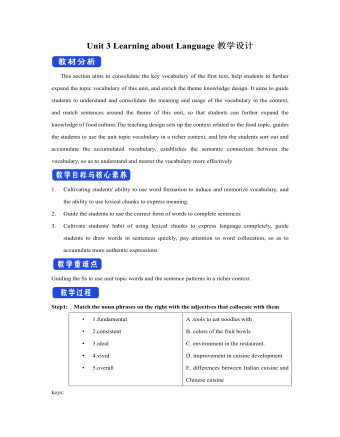
新人教版高中英语选修2Unit 3 Learning about Language教学设计
1. We'll need ten months at least to have the restaurant decorated.2.Some traditional Chinese dishes from before the Ming Dynasty are still popular today.3.My grandpa's breakfast mainly includes whole grain biscuits and a glass of milk.4.People in this area would eat nearly a kilo of cheese per week.5. We enjoyed a special dinner in a fancy restaurant where the waiters all wore attractive suits.6. He prefers this brand of coffee which, as he said, has an unusually good flavor.Key:1. at a minimum 2. prior to3. consist of4. consume5. elegant6. exceptionalStep 5:Familiarize yourself with some food idioms by matching the meaning on the right with the colored words on the left.1.Public concern for the health of farm animals has mushroomed in the UK2.Anderson may be young but he's certainly rolling to doing dough!3.George is a popular lecturer. He often peppers his speech with jokes.4.As the person to bring home the bacon, he needs to find a stable job.5 He is often regarded as a ham actor for his over emphasized facial expressions. The media reported that these companies had treated pollution as a hot potato. 6.The media reported that these companies had treated pollution as a hot potato.7.Don't worry about the test tomorrow. It's going to be a piece of cake!8. It's best to fold the swimming ring when it is as flat as a pancake.A. completely flatB. something that is very easy to do C.an issue that is hard to deal withD.to include large numbers of somethingE.to earn on e's living to support a familyF. wealthyG.to rapidly increase in numberH. an actor who performs badly, especially by over emphasizing emotions
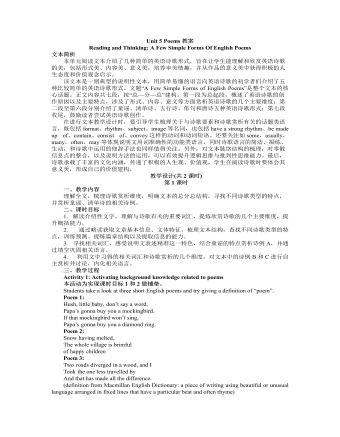
新人教版高中英语选修3Unit 5 Poems教案
本单元阅读文本介绍了几种简单的英语诗歌形式,旨在让学生能理解和欣赏英语诗歌的美,包括形式美、内容美、意义美,培养审美情趣,并从作品的意义美中获得积极的人生态度和价值观念启示。 该文本是一则典型的说明性文本,用简单易懂的语言向英语诗歌的初学者们介绍了五种比较简单的英语诗歌形式。文题“A Few Simple Forms of English Poems”是整个文本的核心话题。正文内容共七段,按“总—分—总”建构。第一段为总起段,概述了英语诗歌的创作原因以及主要特点,涉及了形式、内容、意义等方面赏析英语诗歌的几个主要维度;第二段至第六段分别介绍了童谣、清单诗、五行诗、俳句和唐诗五种英语诗歌形式;第七段收尾,鼓励读者尝试英语诗歌创作。 在进行文本教学设计时,要引导学生梳理关于与诗歌要素和诗歌赏析有关的话题类语言,既包括format、rhythm、subject、image等名词,也包括have a strong rhythm、be made up of、contain、consist of、convey这样的动词和动词短语。
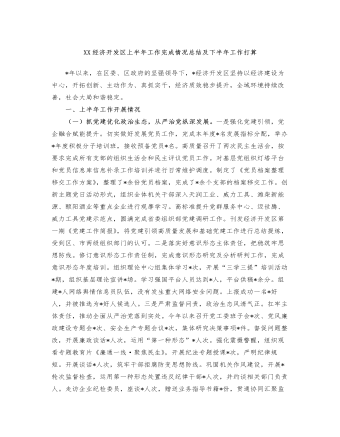
XX经济开发区上半年工作完成情况总结及下半年工作打算
(五)守好筑牢“一排底线”,全力防范化解风险。一是严肃开展环保排查。协调督促*家企业开展了环保设施安全评价、隐患排查,发放风险防范告知书;排查企业燃煤及炉灶使用情况,排查出取暖小煤炉*个;开展危废固废排查百日攻坚行动及废旧金属回收企业情况;对*年中央及省环保督查反馈的环保督办件开展回头看,督导企业按要求整改,避免反弹。密切关注大气监测子站污染指标情况,重点对土方堆场、施工工地、裸露土地等易产生扬尘场所进行专项整治,控制污染超标问题。开展环境影响跟踪评价工作,编制的《*经济开发区环境跟踪评价报告》已通过省环保厅的审查。编制的《*经济开发区循环化改造实施方案(*-*)》已经*市发改局评审通过。二是配合自建房安全专项整治。以经营性自建房为重点,对开发区自建房开展拉网式排查。目前开发区共排查自建房*栋,其中经营性自建房*户,均录入住建部信息归集平台,隐患房屋*栋,已按要求完成房屋质量鉴定。
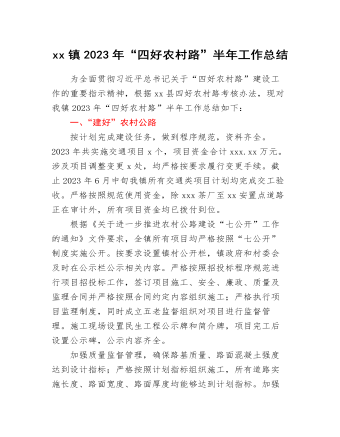
xx镇2023年“四好农村路”半年工作总结
一、“建好”农村公路按计划完成建设任务,做到程序规范,资料齐全。2023年共实施交通项目x个,项目资金合计xxx.xx万元。涉及项目调整变更x处,均严格按要求履行变更手续。截止2023年6月中旬我镇所有交通类项目计划均完成交工验收。严格按照规范使用资金,除xxx茶厂至xx安置点道路正在审计外,所有项目资金均已拨付到位。根据《关于进一步推进农村公路建设“七公开”工作的通知》文件要求,全镇所有项目均严格按照“七公开”制度实施公开。按要求设置镇村公开栏,镇政府和村委会及时在公示栏公示相关内容。严格按照招投标程序规范进行项目招投标工作,签订项目施工、安全、廉政、质量及监理合同并严格按照合同约定内容组织施工;严格执行项目监理制度,同时成立五老监督组织对项目进行监督管理。施工现场设置民生工程公示牌和简介牌,项目完工后设置公示碑,公示内容齐全。加强质量监督管理,确保路基质量、路面混凝土强度达到设计指标;严格按照计划指标组织施工,所有道路实施长度、路面宽度、路面厚度均能够达到计划指标。加强安全管理,按照要求设置错车道,路面刻纹均达到标准,路肩填培及时平顺,边沟排水通畅。围绕项目建设工作开展情况扎实开展问题自查自纠,半年来共发现项目建设问题14处,均及时完成整改。通过配备洒水车、设置围挡等措施,落实项目施工现场环保措施,确保项目施工不对周边环境产生不良影响。
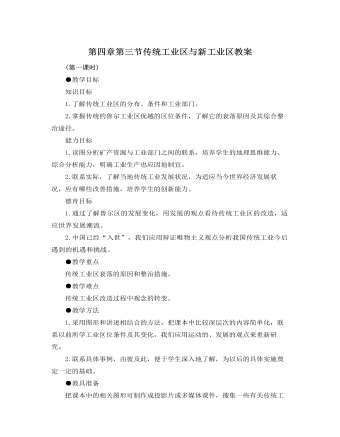
人教版新课标高中地理必修2第四章第三节传统工业区与新工业区教案
知识目标1.了解传统工业区的分布、条件和工业部门。2.掌握传统的鲁尔工业区优越的区位条件,了解它的衰落原因及其综合整治途径。能力目标1.读图分析矿产资源与工业部门之间的联系,培养学生的地理思维能力、综合分析能力,明确工业生产也应因地制宜。2.联系实际,了解当地传统工业发展状况,为适应当今世界经济发展状况,应有哪些改善措施,培养学生的创新能力。德育目标1.通过了解鲁尔区的发展变化,用发展的观点看待传统工业区的改造,适应世界发展潮流。2.中国已经“入世”,我们应用辩证唯物主义观点分析我国传统工业今后遇到的机遇和挑战。
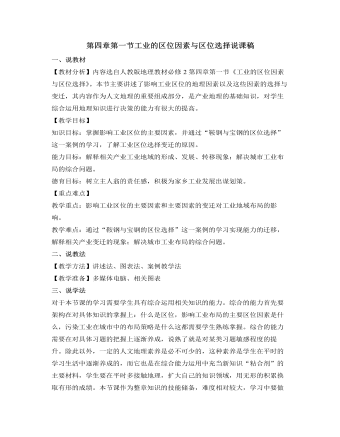
人教版高中地理必修2第四章第一节工业的区位因素与区位选择说课稿
在这段教学中可以插入世界主要铁矿、煤矿,以及我国主要的矿产基地、钢铁生产基地的相关内容,不失为区域地理知识的很好补充和巩固。那么从现状来看我国的钢铁产业基地多数污染较为严重,可见工业区位的选择同样要顾及到环境的因素,由此引入下一部分的内容。除了传统意义上的工业区位因素外,环境、政策以及决策者的理念和心理等日益受到人们的关注。在这段文字的处理上,只需进行概念、道理上的陈述即可,重点要放在污染工业在城市中的布局这一知识点上。首先要了解什么工业会造成怎样的污染,然后根据污染的类别分别讲解不同的应对方略,最后将配以适当的例题以期提高学生的整体把握程度和综合运用能力。最后将对本节内容进行小结,要在小结中阐述清楚本节课的两大内容:即工业的区位因素和工业区位的选择。然后点明本节课的主要知识点、难点、重点。在时间允许的情况下可以适当安排几道有关主导产业和城市工业布局的例题加以练习。
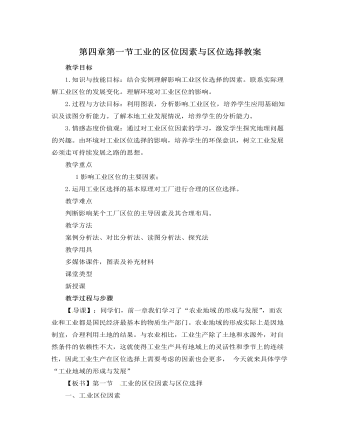
人教版新课标高中地理必修2第四章第一节工业的区位因素与区位选择教案
教学目标1.知识与技能目标:结合实例理解影响工业区位选择的因素。联系实际理解工业区位的发展变化。理解环境对工业区位的影响。2.过程与方法目标:利用图表,分析影响 工业区位,培养学生应用基础知识及读图分析能力。了解本地工业发展情况,培养学生的分析能力。3.情感态度价值观:通过对工业区位因素的学习,激发学生探究地理问题的兴趣。由环境对工业区位选择的影响,培养学生的环保意识,树立工业发展必须走可持续发展之路的思想。教学重点1影响工业区位的主要因素;2.运用工业区选择的基本原理对工厂进行合理的区位选择。教学难点 判断影响某个工厂区位的主导因素及其合理布局。教学方法 案例分析法、对比分析法、读图分析法、探究法教学用具 多媒体课件,图表及补充材料课堂类型
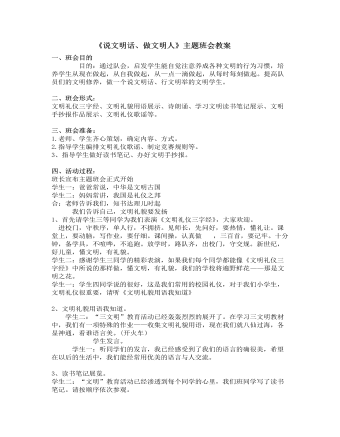
《说文明话, 做文明人》主题班会教案
2、文明礼貌用语我知道。学生二:“三文明”教育活动已经轰轰烈烈的展开了。在学习三文明教材中,我们有一项特殊的作业——收集文明礼貌用语,现在我们就八仙过海,各显神通,看谁语言美。(开火车)学生发言。学生一:听同学们的发言,我已经感受到了我们的语言的确很美,希望在以后的生活中,我们能经常用优美的语言与人交流。3、读书笔记展览。学生二:“文明”教育活动已经渗透到每个同学的心里,我们班同学写了读书笔记。请按顺序依次参观。4、文明手抄报展览。5、为获奖同学颁发奖状。(自制奖状)学生一:我们学了那么多,最终目的就是让我们“说文明话,行文明举,做文明人”。请欣赏〈文明礼仪歌谣〉
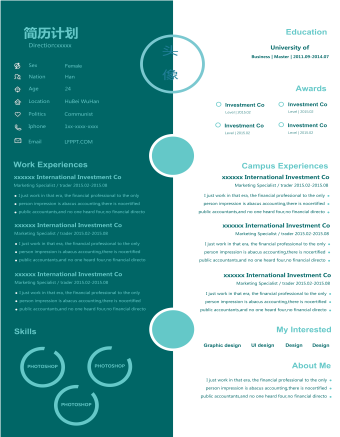
中英文简历
I just work in that era, the financial professional to the onlyperson impression is abacus accounting,there is nocertified publicaccountants,and no one heard four,no financial directo.
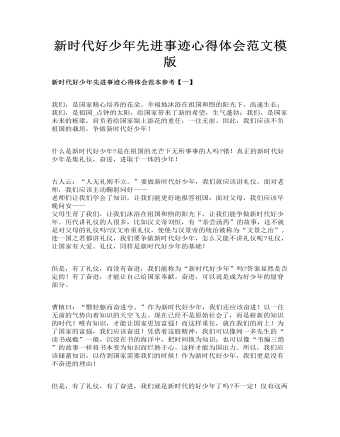
新时代好少年先进事迹心得体会范文模版
古人云:“人无礼则不立。”要做新时代好少年,我们就应该讲礼仪。面对老师,我们应该主动鞠躬问好——老师们让我们学会了知识,让我们能更好地报答祖国;面对父母,我们应该早晚问安——父母生育了我们,让我们沐浴在祖国和煦的阳光下,让我们能争做新时代好少年。历代讲礼仪的人很多,比如汉文帝刘恒,有“亲尝汤药”的故事,这不就是对父母的礼仪吗?汉文帝重礼仪,使他与汉景帝的统治被称为“文景之治”。连一国之君都讲礼仪,我们要争做新时代好少年,怎么又能不讲礼仪呢?礼仪,让国家有大爱。礼仪,同样是新时代好少年的基础!
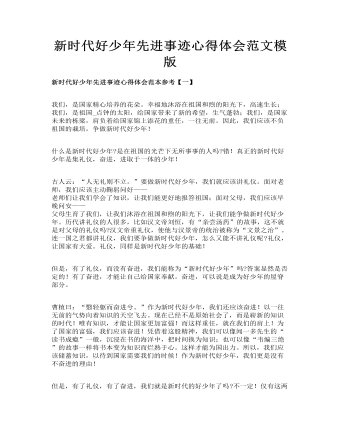
新时代好少年先进事迹心得体会范文模版
古人云:“人无礼则不立。”要做新时代好少年,我们就应该讲礼仪。面对老师,我们应该主动鞠躬问好——老师们让我们学会了知识,让我们能更好地报答祖国;面对父母,我们应该早晚问安——父母生育了我们,让我们沐浴在祖国和煦的阳光下,让我们能争做新时代好少年。历代讲礼仪的人很多,比如汉文帝刘恒,有“亲尝汤药”的故事,这不就是对父母的礼仪吗?汉文帝重礼仪,使他与汉景帝的统治被称为“文景之治”。连一国之君都讲礼仪,我们要争做新时代好少年,怎么又能不讲礼仪呢?礼仪,让国家有大爱。礼仪,同样是新时代好少年的基础!
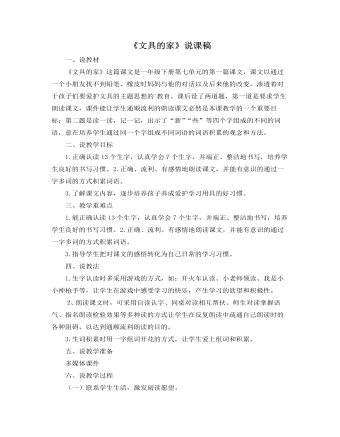
部编人教版一年级下册《文具的家》说课稿
一、说教材《文具的家》这篇课文是一年级下册第七单元的第一篇课文,课文以通过一个小朋友找不到铅笔、橡皮时妈妈与他的对话以及后来他的改变,渗透着对于孩子们要爱护文具的主题思想的`教育。课后设了两道题,第一道是要求学生朗读课文,课件能让学生通顺流利的朗读课文必然是本课教学的一个重要目标;第二题是读一读,记一记,出示了“新”“些”等四个字组成的不同的词语,意在培养学生通过同一个字组成不同词语的词语积累的观念和方法。二、说教学目标1.正确认读13个生字,认真学会7个生字,并端正、整洁地书写,培养学生良好的书写习惯。2.正确、流利、有感情地朗读课文,并能有意识的通过一字多词的方式积累词语。3.了解课文内容,逐步培养孩子养成爱护学习用具的好习惯。


